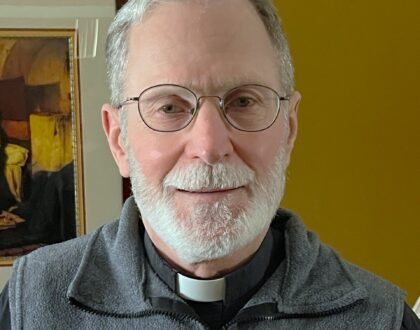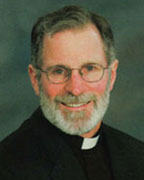Homily, September 10, 2023

From The Pastor
I, for one, am so glad God understands the human way. God knows what it means to be human through the personal lived experience of Jesus. Jesus knows the heights of human dignity and joy, as well as the darkness and disorder that can creep into the human heart. I can almost feel the comfort and love Jesus felt as Mary washed his feet with her tears and dried them with her hair in anticipation of his journey to the Cross. Jesus also knows and understands the experience of being hated, rejected, misunderstood, ignored, called a fake, and scorned as a blasphemer.
How did Jesus put up with it all? An immature answer would be that he was God and it didn’t really bother him. A more mature answer would understand and accept Jesus in both his Divine and human nature. Jesus knew the deep joy and compassion of our human nature in those who loved him. He also suffered deep distress in the hatred and humiliation of those who rejected him as a lie. How did he do it? Jesus loved himself in the pure love of the Father. He could tolerate hate and rejection because he trusted himself in the heart of the Father’s love.
It is with intentional wisdom that the two greatest commandments are to love God with your whole self, and to love your neighbor as yourself. If we love ourselves little, we can only by reason love others with little love. After listing several of the Commandments, St. Paul reaches past the rule of Law to the life of the Spirit concluding, “You shall love your neighbor as yourself.”
Wow! That challenges a lot. It challenges us to accept God as loving, trustworthy understanding, and forgiving. It confronts images of God that cling to the idea that God is a punishing sin counter needing to be appeased. If I trust God as loving and merciful, I will be confident to bring myself before the Lord despite my failure and weakness. In doing so I encounter a felt experience of God’s mercy in my person, with the acceptance of God’s love for me just as I am. I learn to accept God’s personal and specific love for me as an imperfect human being. This becomes the ground in which my love for others will grow.
In the gospel, Jesus teaches us the need to forgive others their offenses. He does so in a social and relational way. Notice that it is person to person, then a small group of supporters, and finally to the larger faith community. Why does Jesus do this? Sin and personal offense will always have an effect on relationships in the larger community.
When a person hurts or offends us, we carry that hurt around in our heads and in our bodies. Often enough, or too often, we complain about the offending party and share the pain of the offense with others. In time, not only is a single person hurt or offended, but the larger community is negatively burdened in the continual retelling of the harm done. Jesus directs us to the root of the problem.
Ours is a broken world. We hurt others and others hurt us. Such offenses are personal, social, communal, familial, national, and global. They touch every aspect and reality of human life. The Christian way calls us to the greater good of forgiveness. The first movement of forgiveness is engaging our faith in the love God has for us, and the fruit of that love in all we ourselves are forgiven. Forgiveness is not simple business. It is hard. Some offenses are small while others are deep or even tragic. If love is the root of the Christian life, then forgiveness is the flower or the fruit it produces.
Jesus talks about binding and loosing. Each of us has the power to forgive, to release the offender or to hold them bound. This is real power and it has real consequences. To sincerely forgive another is to free them from the debt of their offense. Ideally, for the sake of a new or restored relationship. This is always a two-way street. To unbind or release the offender, you are also releasing yourself. This is the wisdom gained in forgiveness against the prison of unforgiveness.
To bind another person through unforgiveness is a form of self-punishment. The one who binds becomes the one who is bound. Consider the wasted energy and heavy emotional weight a person carries by not releasing the offense of the other. To bind forgiveness is to bind love. To bind love is to lose the capacity to love our self freely and maturely. Old unforgiven wounds affect the mind, body, and soul of a person. The weight of judgment, condemnation, rejection, or hatred wears on a soul and blocks the ability to realize the freedom and gift of Divine Love.
To loose is to set free. To forgive is an act of self-love that has the capacity to reach and offer freedom to the other. To not forgive harms you more than the offender. Jesus gave his life to offer with perfect love that forgives every sin and offense. For all Jesus suffered, under the weight of human hatred and sin, he could still pray, “Father, forgive them. They don’t know what they are doing.” When we reject forgiveness, we do not know what we are doing or the weight we force ourselves to carry. This is serious business. God has given us the Divine power to bind or to release. Choose love’s forgiveness and free yourself and the other.
Father John Esper
Recent Sermons

Homily, March 30, 2025
March 27, 2025

Homily, March 23, 2025
March 20, 2025

Homily, March 16, 2025
March 11, 2025

